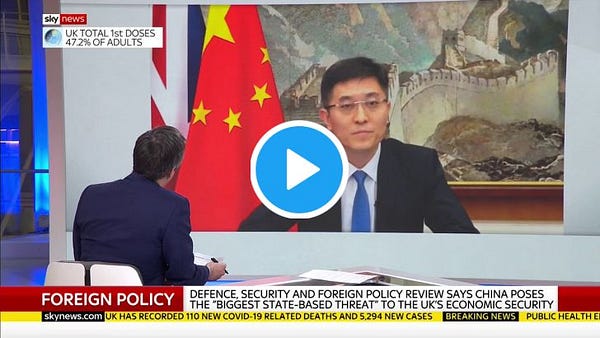Tesla Motors is believed to be secretly collecting data, the prime minister of the U.K. has started welcoming thousands fleeing Hong Kong, and the U.S. is accused of serving instant noodles to a top diplomat from Beijing. It’s just another week of news about China—which you can easily share or subscribe to by hitting these buttons below:
The denial driven by Tesla


“China to restrict use of Tesla vehicles by military and state personnel,” reported the Wall Street Journal, referencing concern over national security leaks through data collected in the electric cars. The story was followed by a timely appearance by Elon Musk at a Chinese forum, in which he assured the confidentiality of information.
New greetings in England


Contact with four families that moved from Hong Kong to the U.K. was accompanied by the announcement that 27,000 other people have taken Boris Johnson up on the offer of providing a pathway to citizenship, with up to 300,000 expected in the next five years. But the deal has also stoked debates on how harshly the U.K. should be treating China:


“Those who call for a new Cold War on China, or for us to sequester our economy entirely from China, which seems to be the new policy of the opposition… are, I think, mistaken,” Johnson told parliament. But some senior Conservative MPs consider it naive to continue to collaborate with China in areas like the economy and climate change.
The realities of cruelty


Amnesty International is calling on China to release all Uighur children being held in state orphanages without the consent of their families, in conjunction with a report in which parents detail the horror of family separation. Uighur exiles are also putting pressure on the White House to demand the closure of the infamous internment camps in Xinjiang.
A new media clampdown
The return of Jack Ma coincided with reports that Beijing want his company Alibaba out of the news media, including the Hong Kong-based South China Morning Post. And questions still linger around why Ma vanished from public life just after criticizing Chinese regulators, upon which they called off his Ant Group’s stock market debut:
The last words, for now
Alaska is the site of the first high-level talks between the Biden administration and China, which provided some viral sideshows. Female translator Zhang Jing went viral for her gracefully glamorous approach to interpreting the tension, while Chinese state media highlighted the fact that the meals served by the U.S. were apparently sparse:


The China Letter is produced by the Canadian Freedom Institute, a think tank based in Canada. We produce the China Letter every week to keep you informed and to press the ideas of free markets and free people not only in China but around the world. Please consider donating to keep this newsletter running!







